Hershel Williams, a Hero in the Battle for Iwo Jima, Dies at 98
"This Medal [of Honor] doesn’t belong to me. It belongs to them, because they gave their lives for me."
By Richard Goldstein
The New York Times
June 29, 2022
Medal of Honor recipient Hershel 'Woody' Williams
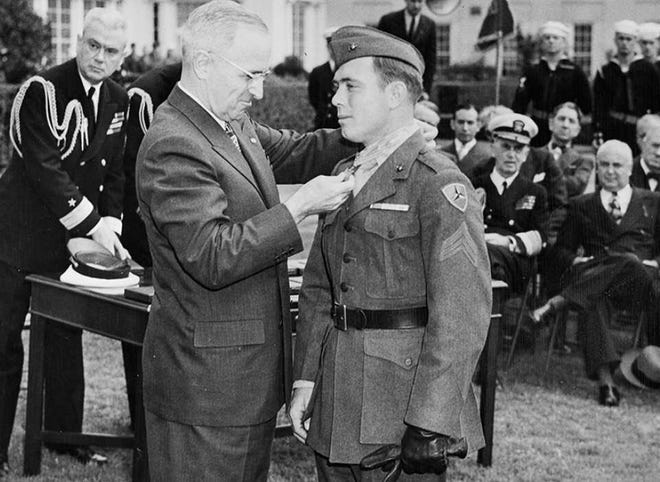 President Truman presented Hershel "Woody" Williams with the Congressional Medal of Honor on October 5, 1945
President Truman presented Hershel "Woody" Williams with the Congressional Medal of Honor on October 5, 1945
He was the last of the 27 Marines and Navy servicemen who received Medals of Honor in the 36-day fight for the Japanese island.
Hershel Williams, the last survivor among the 472 servicemen who were awarded
the Medal of Honor for extraordinary bravery in World War II and the oldest
living recipient of the medal, died on Wednesday in Huntington, W.Va. He was
98.
His death, at the Huntington Veterans Affairs Medical Center, was announced by
the Woody Williams Foundation.
 Terror: US Marines crawl their way up the coastline of Iwo Jima, while
under heavy fire from the surprisingly intact Japanese defenses. Mount Suribachi looms in the background
Terror: US Marines crawl their way up the coastline of Iwo Jima, while
under heavy fire from the surprisingly intact Japanese defenses. Mount Suribachi looms in the background
Corporal Williams was lying prone on the black volcanic ash of Iwo Jima the
morning of Feb. 23, 1945, when he was startled by the sounds of cheering.
“Suddenly, the Marines around me starting jumping up and down, firing their
weapons in the air,” he told the Marine Corps History Division long afterward.
“My head was buried in the sand. Then I looked up and saw Old Glory on top of
Mount Suribachi.”
Williams on Iwo for another look at Mount Suribachi, scene of the iconic flag raising
The raising of a large American flag by six Marines atop Iwo Jima,
photographed by Joe Rosenthal of The Associated Press, became an enduring
image of the American fighting man in World War II.
But the fight for the Japanese-administered island and its airfields some 750
miles south of Tokyo, needed by the Army Air Forces to support long-range
bombing missions over Japan, was only in its fifth day when the flag went up.
The battle was just beginning for Corporal Williams, a 21-year-old Marine from
West Virginia.
That afternoon, Corporal Williams wiped out seven Japanese pillboxes with
flamethrowers, opening a gap that enabled Marine tanks and personnel carriers
to break through the enemy defenses. He scurried from one pillbox to another,
miraculously untouched by the intense Japanese machine-gun fire that bounced
off his equipment — sounding, as he told it, like a jackhammer.
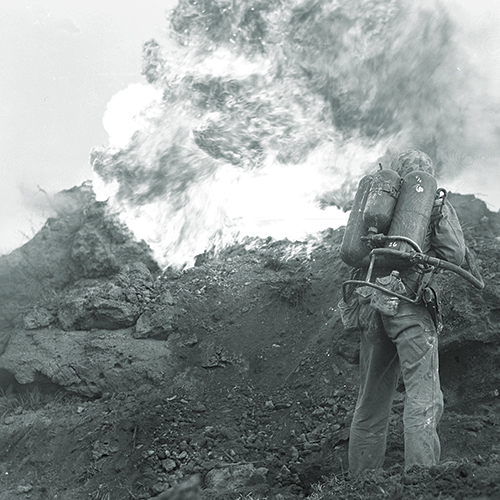 As Williams approached the Japanese pillboxes, bullets ricocheted off the tank of his flamethrower.
As Williams approached the Japanese pillboxes, bullets ricocheted off the tank of his flamethrower.
During his four-hour foray, in which he received supporting fire from several
fellow Marines, two of whom were killed during the mission, he returned five
times to his headquarters to get new flamethrowers when his supply of diesel
fuel and high-octane gasoline ran out.
He received the Medal of Honor, the nation’s highest award for valor, from
President Harry S. Truman in October 1945. The citation stated that his
“unyielding determination and extraordinary heroism in the face of ruthless
enemy resistance were directly instrumental in neutralizing one of the most
fanatically defended Japanese strong points encountered by his regiment.”
A total of 27 Marines and Navy servicemen received the medal, 14 of them
posthumously, for heroism in the 36-day battle for Iwo Jima.
Decades after World War II, the Medal of Honor was awarded to more than two
dozen African American and Asian American servicemen who had engaged in
extraordinary combat feats in the war but had been passed over for it,
presumably a result of racial prejudice, bringing the total of recipients to
472.
The Medal of Honor was also accorded to an unidentified serviceman killed in
World War II and another who died in the Korean War when their remains were
reburied at the Tomb of the Unknown Soldier in Arlington National Cemetery in
1958, joining an unidentified World War I serviceman.
Hershel Woodrow Williams, known as Woody, was born on Oct. 2, 1923, in the
tiny community of Quiet Dell, W.Va., the youngest of 11 children of Lloyd and
Lurenna Williams. Six of his brothers and sisters had died during the 1918-19
flu pandemic.
He helped his parents run their small dairy farm; after his father died of a
heart attack when Woody was 11, his brother Lloyd Jr. took over the farm with
help from the other children. He later quit high school to join the
Depression-era Civilian Conservation Corps, working on projects in Montana.
As a youngster, he had been impressed by the dress-blue uniforms and the
bearing of some hometown boys on furloughs from the Marine Corps. He enlisted
in the Marines in May 1943. He was only 5 feet 6 inches tall, the service’s
minimum height requirement, and weighed just 135 pounds, but he was well
muscled from his farm work.
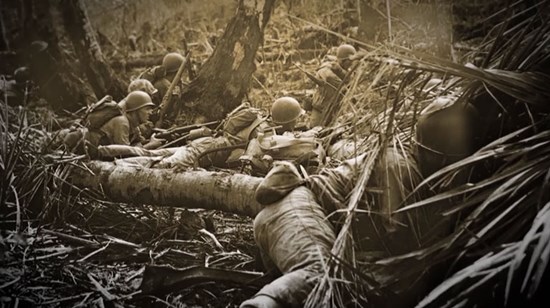
The battle to retake Guam in 1944, Woody's first combat
He saw combat on Guam a year later, then arrived on Iwo Jima with the 21st
Marines of the Third Marine Division. When Marine armored vehicles became
bogged down in their attempt to penetrate the network of Japanese defense
positions, his commander asked him if he could do something to support them.
Thus began his one-man flame-throwing foray.
He told Larry Smith for the oral history “Iwo Jima” (2008) that “you had to
get within 20 yards of a pillbox, with machine-gun bullets kicking up.”
“One time, the men in one pillbox came out,” he recalled. “As they came
running toward me with their rifles and bayonets poised, they ran straight
into the fire from my flamethrower. As if in slow motion, they just fell
down.”
Corporal Williams incurred a leg wound from shrapnel 11 days later, but he
remained on Iwo Jima until the battle ended.
Iwo Jima was the halfway point for the Army Air Forces’ B-29 bombers that set
out from their bases on the Marianas Islands to bomb Japan. The capture of its
airstrips gave the United States a base for fighter planes escorting the
bombers and provided emergency landing sites for crippled B-29s returning from
their missions.
But the seizing of that eight-square-mile spit of volcanic debris was
exceedingly costly. More than one-third of the 70,000 Marines who invaded Iwo
Jima, from the Third, Fourth and Fifth Marine Divisions, were killed or
wounded. All but a thousand or so of the 20,000 Japanese defenders died in the
battle.
Mr. Williams left active military service in November 1945 and returned to his
native West Virginia, where he was a counselor for the Veterans
Administration. He remained in the Marine Corps as a reservist and retired as
a chief warrant officer in 1969. His foundation raises money to provide
scholarships for children who had lost a parent in war.
In March 2020, he attended a ceremony in Norfolk, Va., for the commissioning
of the warship Hershel “Woody” Williams.
Mr. Williams’s wife, Ruby (Meredith) Williams, whom he married in 1945, died
in 2007. They had two daughters, Travie Jane and Tracie Jean, as well as
grandchildren and great-grandchildren. Complete information on survivors was
not immediately available.
In February 2011, Mr. Williams spoke aboard the amphibious assault ship Iwo
Jima at Norfolk on the 66th anniversary of the battle. “I claim to be only the
caretaker of the medal,” he said. “There were 27 medals awarded, but there
were countless others who did as much, if not more.”
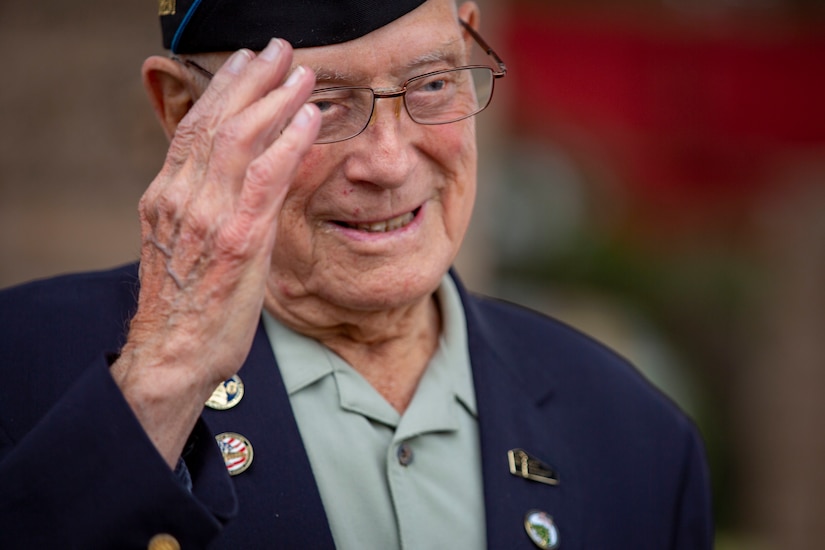
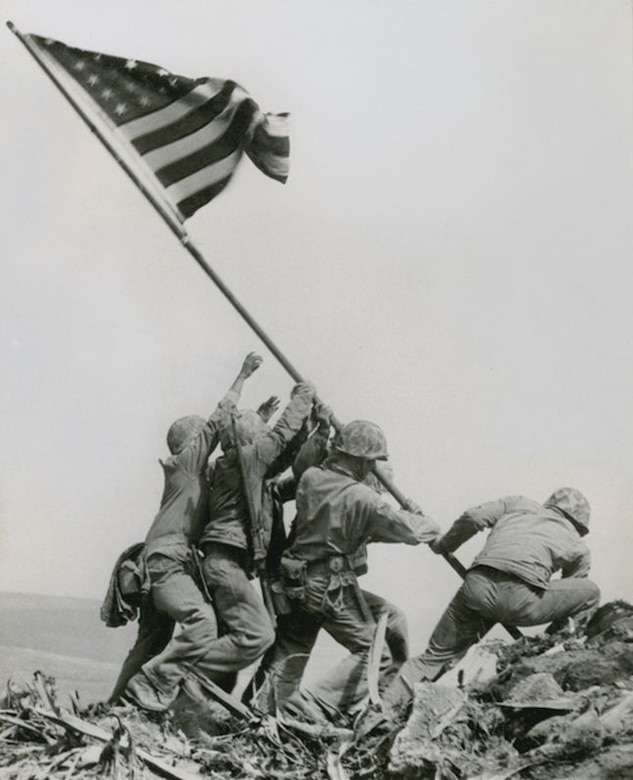
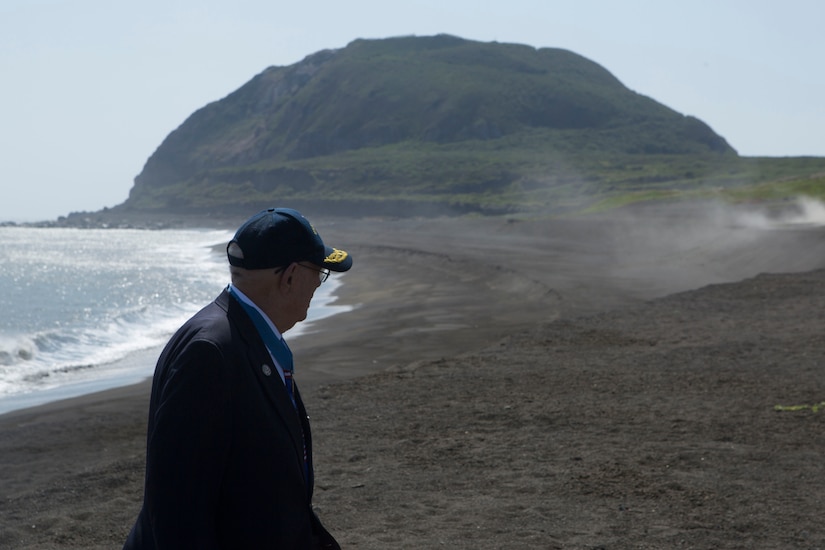
2 comments:
The Greatest Generation. They saved the world.
And they are becoming fewer and fewer every day. We owe them much. We owe them EVERYTHING.
Post a Comment